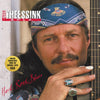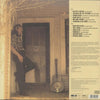



Hans Theessink - Hard Road Blues (DMM)
Vocals, Acoustic Guitar, Electric Guitar, Mandolin – Hans Theessink [click here to see more vinyl featuring Hans Theessink]
Harmonica – Christian Dozzler
Written by Hans Theessink (A1 to A4, A6, B1, B4), Blind Lemon Jefferson (A5), Mance Lipscomb (B3), Lightnin' Hopkins (B5), Skip James (B6)
B2 is a traditional song arranged by Hans Theessink
1 LP, standard sleeve
Original analog Master tape : YES
Direct Metal Mastering
Heavy Press : 180g
Record color : black
Speed : 33 RPM
Size : 12'’
Stereo
Studio
Record Press : Schallplattenfabrik Pallas GmbH
Label : Blue Groove
Original Label : Blue Groove
Recorded October 6th-7th, 1994 by Andreas Fabianek at Recorder Music Studios, Austria
Produced by Hans Theessink, Milica
Direct Metal Mastering by Hendrik Pauler at Pauler Acoustics
Remastered by Christoph Stickel
Graphic Design – Harald Ergott
Photography by Tibor Bozi
Sleeve Notes by Hans Theessink
Originally released in 1994
Reissued in April 2023
Tracks:
Side A:
- Big Bill's Guitar
- You Make Me Feel So Good
- Prison Blues
- Blind Willie
- One Kind Favour
- Vicksburg Is My Home
Side B:
- Hard Road Blues
- Two Trains
- Sugar Babe
- Minnibelle
- Shotgun Blues
- Cypress Grove
Reviews:
"I recorded HARD ROAD BLUES in 2 nights (October 6th-7th, 1994) in the OPUS Recorder Music Studio in Austria in one go and all analog. It was quite a meditative affair, recorded very well by sound engineer Andreas Fabianek. We used a vocal mic, a guitar mic, and a few other mics to capture the natural sound of the room. The recording sounds very organic; you can feel every movement and breathing and you can literally hear the fingers dancing on the fretboard.
The record was first released in 1994 on vinyl, CD and cassette. HARD ROAD BLUES has been highly acclaimed by fans and press alike and has sold very well. If a copy of this pressing ever turns up in good condition, it would cost quite a bit of money. Unfortunately, the fire devil struck at the German pressing plant – many masters and matrices were destroyed; including those of HARD ROAD BLUES. A subsequent pressing was therefore impossible. But during Corona 2020 I had a lot of time to look through my stock of recordings and I also found the HARD ROAD BLUES master tapes. That’s when the idea came up to re-release this record.
I contacted Christoph Stickl from CSMastering. Christoph had already done an excellent remastering of my 1987 “Baby Wants To Boogie” LP and he was therefore predestined to carry out this rather delicate work for HARD ROAD BLUES as well. He reviewed the tapes, which after all, were already 27 years old, and said he’d have to “bake” them in the oven to play them and start remastering. Luckily the tapes were still in good shape and so Christoph was able to do the remastering without interrupting the AAA chain." Hans Theessink
Direct Metal Mastering
In Direct Metal Mastering, the cutting lathe engraves the audio signal directly onto a copper-plated master disc, instead of engraving the groove into a lacquer-coated aluminum disc.
The direct metal mastering technology addresses the lacquer mastering technology's issue of pre-echoes during record play, caused by the cutting stylus unintentionally transferring some of the subsequent groove wall's impulse signal into the previous groove wall. In particular, a quiet passage followed by a loud sound often clearly revealed a faint pre-echo of the loud sound occurring 1.8 seconds ahead of time (the duration of one revolution at 33 rpm). This problem could also appear as post-echo, 1.8 seconds after a peak in volume.
Another improvement is noise reduction. The lacquer mastering method bears a higher risk of adding unwanted random noise to the recording, caused by the enclosure of small dust particles when spraying the silvering on the lacquer master, which is the necessary first step of the electroplating process for reproduction of the master disc. As the DMM master disc is already made of metal (copper), this step is not required, and its faults are avoided.
With the groove being cut straight into a metal foil, this removed a number of plating stages in the manufacturing process. This gave rise to more upper frequency levels and less surface noise. Additionally, groove pre-echo problems are significantly diminished. Bass is typically tight and well defined, even described as more accurate than the fat, mushy sound of lacquered vinyl pressings.
Ratings:
AllMusic : 4 / 5 ; Discogs : 4.31 / 5



